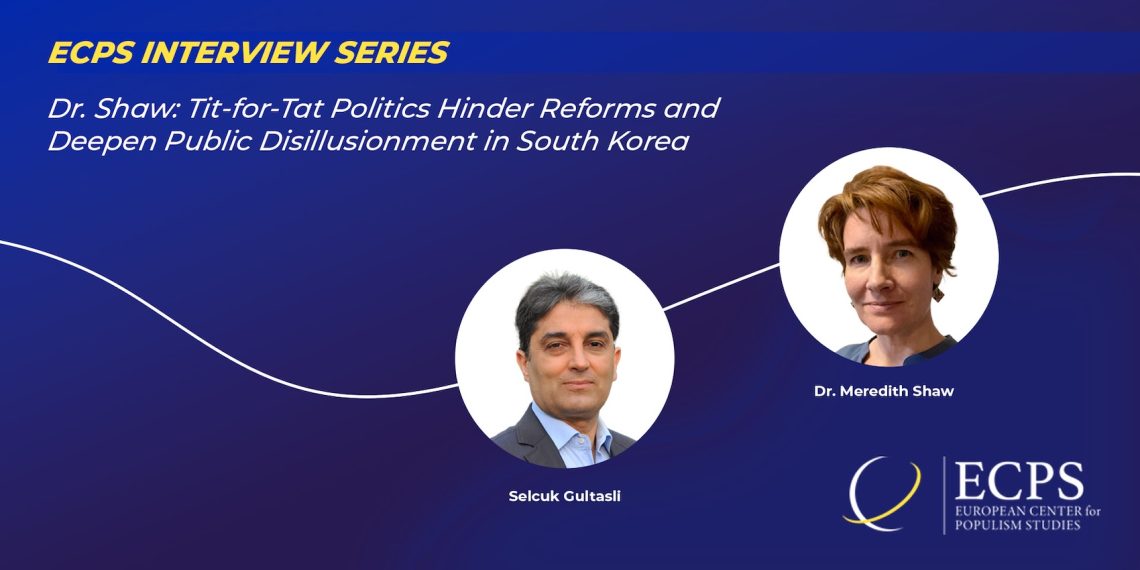As South Korea’s Constitutional Court reviews President Yoon Suk Yeol’s impeachment following his martial law declaration, Dr. Meredith Shaw highlights the deep-rooted issues plaguing the nation’s politics. Speaking with the ECPS, Dr. Shaw explains that a “tit-for-tat dynamic” of political retaliation has hindered systemic reforms, while populist appeals during economic crises fuel disillusionment. Drawing on South Korea’s history of authoritarian rule, she emphasizes the need for reform-minded leadership to restore public confidence. “Both sides have behaved in ways that don’t inspire confidence,” Dr. Shaw remarked, urging systemic change to strengthen democratic institutions amid this critical moment for South Korea’s democracy.
Interview by Selcuk Gultasli
As South Korea’s Constitutional Court begins reviewing President Yoon Suk Yeol’s impeachment following his controversial attempt to impose martial law on December 3, 2024, Dr. Meredith Shaw highlights that both sides of South Korean politics have failed to inspire public confidence. According to Dr. Shaw, a tit-for-tat dynamic continues to hinder systemic reforms while entrenching disillusionment with establishment politicians.
South Korea’s political landscape, shaped by its history of authoritarian rule and rapid democratization, faces persistent challenges rooted in populism, economic inequality, and geopolitical tensions. In an interview with European Center for Populism Studies (ECPS), Dr. Shaw, a leading expert on East Asian politics, shared her invaluable insights into South Korea’s current crisis, historical patterns, and the implications for its democracy.
“South Korea has significant experience with authoritarian, particularly military, regimes,” Dr. Shaw noted, referencing the martial law imposed under Park Chung-hee and Chun Doo-hwan that lasted nearly 15 years. These experiences, she explained, left a lasting legacy on political and social movements. “The so-called ‘386 generation,’ who fought courageously against martial law, still lean left-wing and remain deeply skeptical of right-wing leaders.”
Dr. Shaw also addressed the cycles of political retaliation and corruption that have plagued South Korea’s governance. “There’s a historical pattern of people in power helping friends and family in ways that most would consider corrupt, followed by the opposition prosecuting and jailing members of the previous administration,” she explained, adding that this dynamic has obstructed meaningful reform.
Economic instability further complicates the political landscape. “South Korea, like most places, tends to be drawn to populist appeals during times of economic crisis and change,” Dr. Shaw observed. Recent backlash against gender equality movements and perceptions of economic inequality have also fueled populism and anti-feminist sentiment.
Geopolitical narratives amplify these issues. “North Korea is always in the background—not just as a security threat but as a perceived economic burden,” Dr. Shaw remarked. She noted that South Korea’s emphasis on national identity often intertwines anti-communism with anti-Japanese sentiment, allowing political leaders to exploit these narratives.
As South Korea navigates the aftermath of Yoon’s impeachment, Dr. Shaw emphasized the importance of reform-minded leadership. “Both sides have behaved in ways that don’t inspire confidence,” she said, calling for systemic change to strengthen democratic institutions. With the Constitutional Court set to hold its first public hearing on December 27, 2024, this interview offers a comprehensive analysis of South Korea’s ongoing political challenges and the lessons that could shape its future.


